“I Know That My Redeemer Liveth”
Job 1–2; 13; 19; 27; 42
LDS manual: here
Reading
Whereas in earlier books, Jehovah-worship has been fairly straightforward — worship Yahweh or be killed — now we’re seeing a more nuanced and thoughtful view. Job is a guy who endures undeserved suffering, and leads us to ask why. It’s almost as though someone noticed: hey, the consequences of faith are not always unambiguously good. Why, it’s almost as though there’s no correlation between what a person is like, and how their life goes! Almost as though God didn’t exist! How is that possible?
According to the real lesson manual, the Book of Job is intended:
To help class members develop strength to face adversity by trusting the Lord, building their testimonies of him, and maintaining personal integrity.
That’s right! You’re facing adversity because God has a plan for you! Trust him.
Isn’t that what people always say? You’re going through adversity, and it’s hard to understand, but hang in there! It’ll all make sense one day! God has a plan!
Unfortunately if you’re Job, God’s plan is to kill your family, afflict you with boils, and then bully you afterward by bragging about how great he is. But I’m getting ahead of the story.
Read the following story, or play the following video for the class.
Job was a pretty good guy, just the kind God would have been into.
1:1 There was a man in the land of Uz, whose name was Job; and that man was perfect and upright, and one that feared God, and eschewed evil.
1:2 And there were born unto him seven sons and three daughters.
1:3 His substance also was seven thousand sheep, and three thousand camels, and five hundred yoke of oxen, and five hundred she asses, and a very great household; so that this man was the greatest of all the men of the east.
But one day God and Satan are hanging out for some reason, and they make a bet whether Job really loves god or not.
1:6 Now there was a day when the sons of God came to present themselves before the LORD, and Satan came also among them.
1:7 And the LORD said unto Satan, Whence comest thou? Then Satan answered the LORD, and said, From going to and fro in the earth, and from walking up and down in it.
1:8 And the LORD said unto Satan, Hast thou considered my servant Job, that there is none like him in the earth, a perfect and an upright man, one that feareth God, and escheweth evil?
1:9 Then Satan answered the LORD, and said, Doth Job fear God for nought?
1:10 Hast not thou made an hedge about him, and about his house, and about all that he hath on every side? thou hast blessed the work of his hands, and his substance is increased in the land.
1:11 But put forth thine hand now, and touch all that he hath, and he will curse thee to thy face.
1:12 And the LORD said unto Satan, Behold, all that he hath is in thy power; only upon himself put not forth thine hand. So Satan went forth from the presence of the LORD.
So Job’s children, his animals, and his servants are all killed, and Job is understandably upset.
1:20 Then Job arose, and rent his mantle, and shaved his head, and fell down upon the ground, and worshipped,
1:21 And said, Naked came I out of my mother’s womb, and naked shall I return thither: the LORD gave, and the LORD hath taken away; blessed be the name of the LORD.
1:22 In all this Job sinned not, nor charged God foolishly.
That’s not enough for God, though.
2:1 Again there was a day when the sons of God came to present themselves before the LORD, and Satan came also among them to present himself before the LORD.
2:2 And the LORD said unto Satan, From whence comest thou? And Satan answered the LORD, and said, From going to and fro in the earth, and from walking up and down in it.
2:3 And the LORD said unto Satan, Hast thou considered my servant Job, that there is none like him in the earth, a perfect and an upright man, one that feareth God, and escheweth evil? and still he holdeth fast his integrity, although thou movedst me against him, to destroy him without cause.
Yes, here God admits that he destroyed Job for no reason.
Here’s Dan Barker commentary, using the Book of Job to show how morally compromised believers are. (Thanks to David.)
Anyway, Satan responds:
2:4 And Satan answered the LORD, and said, Skin for skin, yea, all that a man hath will he give for his life.
2:5 But put forth thine hand now, and touch his bone and his flesh, and he will curse thee to thy face.
2:6 And the LORD said unto Satan, Behold, he is in thine hand; but save his life.
2:7 So went Satan forth from the presence of the LORD, and smote Job with sore boils from the sole of his foot unto his crown.
I really like how this commenter breaks it down.
What Satan is baiting God with is the prospect of receiving unearned worship and adulation. You see, if God is good, and people worship him for being good, then his ego-strokes only come because he’s living up to his end of the bargain. But Satan tempted God with the chance to receive Job’s adulation and praise regardless of his actions. God wanted to be able to throw all morality to the winds and be literally demonic in the cruelty of his deeds, and still be worshiipped as the ‘perfect, just God’. He doesn’t merely want unearned praise–he wants his worshippers to be so mindless, so utterly servile they will praise him to the skies even as he tortures them. Or, as Job put it, “Though he slay me, yet will I trust him.”
The Book of Job makes it plainly, indisputably, blatantly clear that God cannot be trusted as a Protector, and that he has no ethics at all.
Job’s wife isn’t much help.
2:9 Then said his wife unto him, Dost thou still retain thine integrity? curse God, and die.
2:10 But he said unto her, Thou speakest as one of the foolish women speaketh. What? shall we receive good at the hand of God, and shall we not receive evil? In all this did not Job sin with his lips.
2:11 Now when Job’s three friends heard of all this evil that was come upon him, they came every one from his own place; Eliphaz the Temanite, and Bildad the Shuhite, and Zophar the Naamathite: for they had made an appointment together to come to mourn with him and to comfort him.
Job’s friends aren’t sympathetic, and they hurl accusations against Job in various ways. Eliphaz the Temanite, unaware of God’s bet with Satan, thinks God is just dandy.
4:7 Remember, I pray thee, who ever perished, being innocent? or where were the righteous cut off?
Bildad the Shuhite also argues that God is fair.
8:3 Doth God pervert judgment? or doth the Almighty pervert justice?
Zophar the Naamathite wishes that God would come down and shut Job’s wicked mouth. If only he knew about the bet.
11:4 For thou hast said, My doctrine is pure, and I am clean in thine eyes.
11:5 But oh that God would speak, and open his lips against thee;
11:6 And that he would shew thee the secrets of wisdom, that they are double to that which is! Know therefore that God exacteth of thee less than thine iniquity deserveth.
They all have the same idea: that God is good, and Job must have done something terrible to merit such suffering. But we, having read Chapters 1 and 2, know that — nope — God’s a shit.
Job seems to have figured it out.
9:22 This is one thing, therefore I said it, He destroyeth the perfect and the wicked.
He blasts his friends.
16:2 I have heard many such things: miserable comforters are ye all.
19:19 All my inward friends abhorred me: and they whom I loved are turned against me.
Nevertheless, he maintains his faith in a god who is allowing him to be destroyed.
13:15 Though he slay me, yet will I trust in him: but I will maintain mine own ways before him.
13:16 He also shall be my salvation: for an hypocrite shall not come before him.
Another guy, Elihu, joins the discussion and keeps up the pressure on Job.
34:12 Yea, surely God will not do wickedly, neither will the Almighty pervert judgment.
God must be feeling pretty stupid at this point. All these men are extolling God’s righteousness to Job, who is suffering undeserved torment at God’s hands — again — for no good reason.
So at this point, God breaks in, and to me he sounds rather defensive. His answer, in summary is: “Who the fuck are you? I ain’t gotta explain jack shit to you.” He taunts everyone for not being as strong or as mighty as him.
38:1 Then the LORD answered Job out of the whirlwind, and said,
38:2 Who is this that darkeneth counsel by words without knowledge?
38:3 Gird up now thy loins like a man; for I will demand of thee, and answer thou me.
38:4 Where wast thou when I laid the foundations of the earth? declare, if thou hast understanding.
38:5 Who hath laid the measures thereof, if thou knowest? or who hath stretched the line upon it?
38:6 Whereupon are the foundations thereof fastened? or who laid the corner stone thereof;
40:1 Moreover the LORD answered Job, and said,
40:2 Shall he that contendeth with the Almighty instruct him? he that reproveth God, let him answer it.
God also likes his arms and his voice, so — you know — good self-esteem there, God.
40:9 Hast thou an arm like God? or canst thou thunder with a voice like him?
God also makes reference to many mythical animals he invented, like unicorns, behemoth, and leviathan.
39:10 Canst thou bind the unicorn with his band in the furrow? or will he harrow the valleys after thee?
40:15 Behold now behemoth, which I made with thee; he eateth grass as an ox.
41:1 Canst thou draw out leviathan with an hook? or his tongue with a cord which thou lettest down?
And now we get to the ending, and I think it’s the worst way to end this story. God gives Job more sheep, camels, and oxen — and more children! So everything’s all right, right? He won’t miss his dead children now!
42:10 And the LORD turned the captivity of Job, when he prayed for his friends: also the LORD gave Job twice as much as he had before.
42:11 Then came there unto him all his brethren, and all his sisters, and all they that had been of his acquaintance before, and did eat bread with him in his house: and they bemoaned him, and comforted him over all the evil that the LORD had brought upon him: every man also gave him a piece of money, and every one an earring of gold.
42:12 So the LORD blessed the latter end of Job more than his beginning: for he had fourteen thousand sheep, and six thousand camels, and a thousand yoke of oxen, and a thousand she asses.
42:13 He had also seven sons and three daughters.
I have to confess that, besides the way we’re supposed to act like there’s no harm done, I really hate this ending. The Book of Job is an exploration of why bad things happen to good people, and this is a serious issue for believers. Some people are harmed and never restored. Some people worship Jehovah / Jesus all their lives and never get the goodies. But the Book of Job blows it all by… giving Job the goodies! So what was the lesson here? I thought it was “Worship God, even if you don’t get the goodies.” But no, I was wrong; it appears the lesson is: “Worship God, and eventually you’ll get the goodies!” As far as tacked-on happy endings go, this is up there with the Joad family finding jobs in the movie version of the Grapes of Wrath. It blows the whole thing.
There are lots of ways to deal with adversity — get help from friends or professionals, do things that make you feel better — but this lesson promotes probably the most unhelpful way of dealing with adversity: trust in a cruel and capricious deity.
Main points from the lesson
Satan, and the Problem of Evil
People have always asked: If there’s a good god, why do bad things happen? We could use Epicurus’ formulation:
There’s an entire branch of theology devoted to this called theodicy.
I’m ashamed to say that, maybe because I hadn’t suffered much in my life, the Problem of Evil was never a problem for me in my believing days. What, do you want God to run around fixing everyone’s problems? How are we supposed to grow? and so on.
My view changed when I read “The Tale of the Twelve Officers“, who witness a crime, and refuse to stop it. Each officer gives a rationale — more morally callous than the last — that exactly mirrors an excuse believers give for God’s failure to help people, in a way that any of us would do if we could.
It was, of course, sad to hear that Ms. K had been slowly raped and murdered by a common thug over the course of one hour and fifty-five minutes; but when I found out that the ordeal had taken place in plain sight of twelve fully-armed off-duty police officers, who ignored her terrified cries for help, and instead just watched until the act was carried to its gruesome end, I found myself facing a personal crisis. You see, the officers had all been very close friends of mine, but now I found my trust in them shaken to its core. Fortunately, I was able to talk with them afterwards, and ask them how they could have stood by and done nothing when they could so easily have saved Ms. K.
Let’s back up. It was easy to explain evil in the polytheist days: There are good gods and evil gods, and an evil god did it.
It was sort of easy to explain evil in the early monotheist days as well: God did all the good and the bad stuff, and he didn’t really care what you thought. For example, we have these scriptures that reflect the idea that God does everything, good and bad:
Amos 3:6 Shall a trumpet be blown in the city, and the people not be afraid? shall there be evil in a city, and the LORD hath not done it?
Isaiah 45:7 I form the light, and create darkness: I make peace, and create evil: I the LORD do all these things.
But having God do bad stuff conflicted with the notion that he was loving and merciful, and as those latter aspects became more and more important to people, something had to give. So the victim-blaming rationale became popular: You deserved bad things to happen to you because you’d done something bad. But eventually even that answer seemed unsatisfactory to many. A new answer was needed. And now — what a coincidence — just at the time that Bible writers were grappling with the reason for undeserved suffering, they were developing a new character to explain it: Satan. And the new explanation is: God is good, but there’s a devil who messes you up.
Satan hasn’t been a character in the Old Testament until now. Oh, sure, there was a talking snake in the Garden, but he was just a snake. The word satan (Hebrew ‘stn‘) just meant ‘an adversary‘. In the story of Balaam (Numbers 22:22), the angel of the Lord that was meant to turn Balaam away from the king was a ‘satan’. In 1 Samuel 29:4, the Philistines debate whether to help David, lest he be a ‘satan’ to them. The idea of Satan as a adversarial supernatural being appears to be an innovation in the Book of Job. And notice how he’s pretty chummy with God at first, dropping in, chatting, and of course making bets.
Admittedly, the Satan explanation for evil isn’t that much better, because why would God allow an evil being to roam about mucking things up? But at least it absolves God of the direct responsibility for doing evil things. It even allows the semblance of free agency — you have God and Satan; which one are you going to follow?
Satan is an evolved explanation for the Problem of Evil, but one that causes more problems than it solves.
People are better than their god
Elihu taunts Job, asking if he has the audacity to think he’s more righteous than God.
35:1 Elihu spake moreover, and said,
35:2 Thinkest thou this to be right, that thou saidst, My righteousness is more than God’s?
My answer is a resounding “yes!” In church, we’re accustomed to hearing how great God is, and how we are nothing, less than the dust of the earth. It’s time to shake that off and realise that the reverse is true. We — all of us — are more moral than God. This should be obvious to anyone who’s been following these lessons, but let’s just have a quick recap.
Ask the class which of these actions they would perform:
- Condemn humanity to suffering for one couple’s disobedience
- Drown all but a handful of your children
- Allow slavery, but be angry when your own people are slaves
- Kill the firstborn child of a group of people
- Have all knowledge of medicine and science, but only reveal details of animal sacrifice and furniture building to your chosen people
- Instruct your people to commit genocide
- Kill your way out of every problem you created and foresaw
- Demand first, last, and always, that you be obeyed
- Know in advance about every atrocity that’s happening or will happen, but do nothing to stop it
- Condemn some of your children to an eternity of any the following — torture, isolation from family, separation from you — for not believing in you or loving you enough
The god of the Bible is claimed — by his followers, no less — to have done or to do each of these things, and yet instead of hunting him down and purging him from their society like you would do to any human that did them, they somehow account him worthy of worship. It’s really breathtakingly perverse when you think about it.
Check out this blistering litany from Matt Dillahunty to a caller.
You are moral than the god that they forced you to believe, that they’ve conned you into accepting! You don’t believe that I necessarily deserve to go to hell for exercising the “free will” that you think your god gave me. You don’t think that the dictates of a conscience — whether or not somebody believes — is a sufficient justification for eternal torture…. You are better than your god. You are better than your religion. So am I, so is Don, so is damn near everybody on the planet! I wish people would wake up and see this! Stop apologising for this (holds up Bible)! It’s not the Good Book! There’s nothing good about it! All it does is poison minds!
Amen.
Resurrection
In the Old Testament, resurrection was never really on the cards. Job seems to take the prevailing view that people just die, and then nothing happens to them.
7:9 As the cloud is consumed and vanisheth away: so he that goeth down to the grave shall come up no more.
And yet, in Job, we start to see glimmers of the idea that people will have some kind of existence after death.
19:25 For I know that my redeemer liveth, and that he shall stand at the latter day upon the earth:
19:26 And though after my skin worms destroy this body, yet in my flesh shall I see God:
Christianity is going to need this when it gets invented. Without a wonderful tantalising afterlife to look forward to, this religion lacks something in the motivation department. With Judaism, who cared if you were motivated? It was your ethnic religion, you were born into it, and you’re stuck with it. But for Christianity, which had to attract converts, a nothing sort of afterlife wasn’t going to cut it. And this is why we find Christianity seizing upon such scriptures in a hope for a heaven — an innovation that started right here in Job.
My father died in 2004 or 2005. We’re still not sure which. (No, it’s nothing that mysterious. In his sleep on New Year’s Eve.) It wasn’t funny at the time, but now to me, it is, just a little bit. Sorry, Dad!
Dad’s death was a bit of an earthquake that wrenched a lot of my calcified belief free. Questions of existence and afterlife took on a new urgency. I was the adult now. No older generation acting as a buffer for life’s uncertainties. You’re the next to go. So if I was wrong in my belief, and there was no consciousness after death, I damn well wanted to know. I think this “wanting to know” is probably the beginning of the end of belief for a lot of people. If you’re content to go back to sleep, and hang on to faith — take the blue pill — then you can believe anything forever, be wrong for the whole of your life, and never know it. But if you really want to know… then you can start to investigate a little more stringently. Which I began do to, and I did not like what I found.
At Dad’s gravesite, I found myself speaking aloud this verse from Job:
14:14 If a man die, shall he live again?
My sister, also present, immediately told me, “Yes.” Which is her way. Always cuts straight to the faithful answer. Love her to pieces.
In the weeks and months to come, leading up to my deconversion, I began to realise that this question — do we live after death? — is really the critical question that all the others hang off of. If the answer is yes, then it’s logical to live one way. If the answer is no, it’s logical to live another. You can’t live halfway between.
So it took me a while to answer Job’s question: “If a man die, shall he live again?” And looking at the evidence, I had to admit that the answer was: Probably not. It’s time to admit that we’ve never seen any evidence of anyone coming back from being really truly dead. Oh, sure there’s no shortage of people telling us that heaven is real, and it’s usually people selling books about how heaven is real. But really, all we know is that this life is all we get. And if you’re reading this on a computer, then you’re one of the lucky few for whom life is the easiest, the longest, and the most luxurious it’s ever been for any group of people on earth. Yes, there are struggles and challenges. But there’s food and sex and art and music and people.
It’s all happening right now, and it’s too precious to waste in a church that promises that if you give them your money and obedience now, you can live in heaven when you die. Make your life better today.
Additional teaching ideas
Good things in the Bible
Withholding food and clothing from the poor is specifically mentioned as iniquity several times in Job.
31:16 If I have withheld the poor from their desire, or have caused the eyes of the widow to fail;
31:17 Or have eaten my morsel myself alone, and the fatherless hath not eaten thereof;
31:18 (For from my youth he was brought up with me, as with a father, and I have guided her from my mother’s womb;)
31:19 If I have seen any perish for want of clothing, or any poor without covering;
31:20 If his loins have not blessed me, and if he were not warmed with the fleece of my sheep;
31:21 If I have lifted up my hand against the fatherless, when I saw my help in the gate:
31:22 Then let mine arm fall from my shoulder blade, and mine arm be broken from the bone.
Science in the Bible
Bible adherents like to quote Job for this tidbit of scientific wisdom:
26:7 He stretcheth out the north over the empty place, and hangeth the earth upon nothing.
See? The earth hangs on nothing! Proof that the Bible is accurate in its knowledge of the universe.
Except that just four verses later, heaven has pillars:
26:11 The pillars of heaven tremble and are astonished at his reproof.
So far, no efforts have been made on the part of Christian scientists to find the pillars of heaven, because everyone knows that’s metaphorical.
Also metaphorical in Job is the idea that the sky is some kind of strong glassy barrier.
37:18 Hast thou with him spread out the sky, which is strong, and as a molten looking glass?
And that men lactate.
21:23 One dieth in his full strength, being wholly at ease and quiet.
21:24 His breasts are full of milk, and his bones are moistened with marrow
21:25 And another dieth in the bitterness of his soul, and never eateth with pleasure.
Enjoy that mental image, and I’ll see you next week.

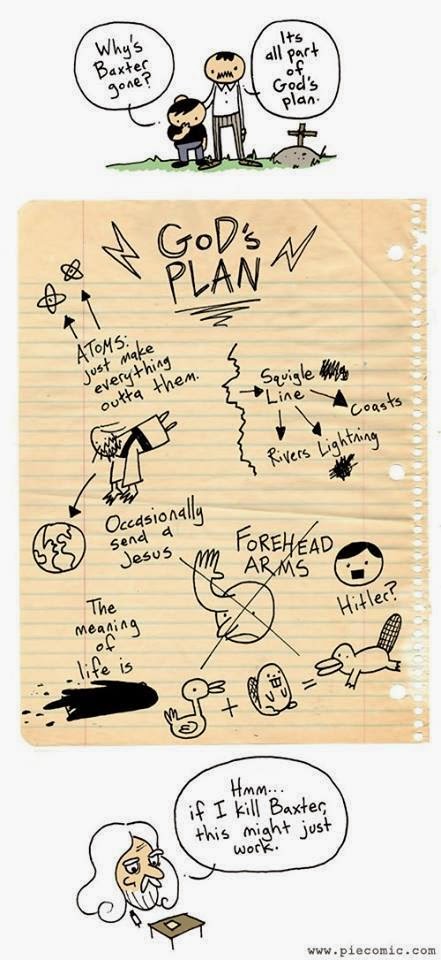

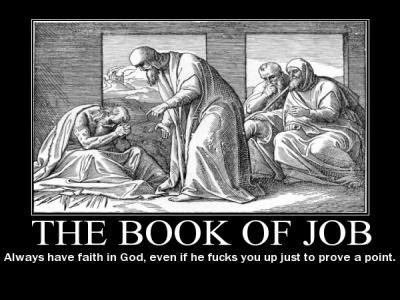
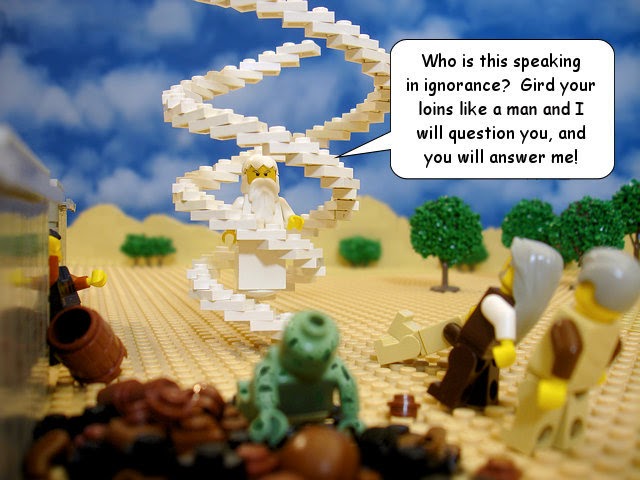
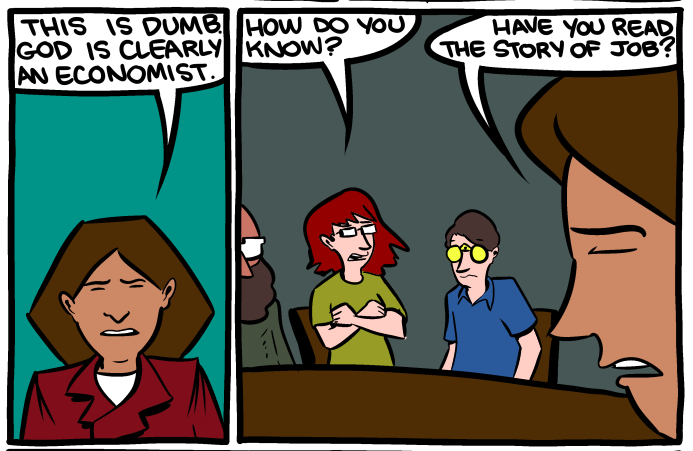
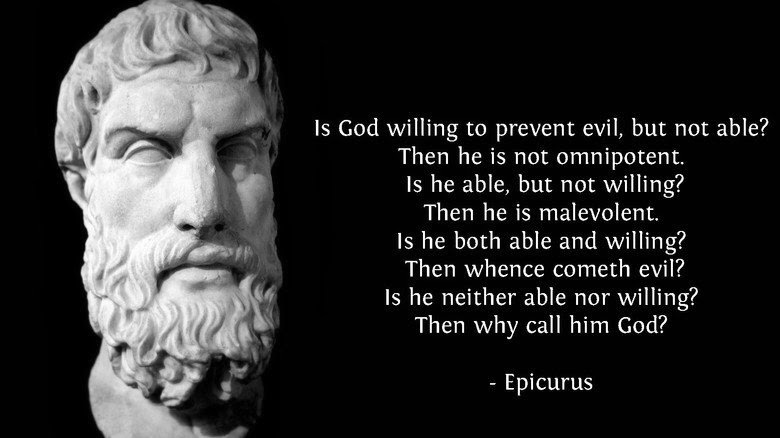


Recent Comments